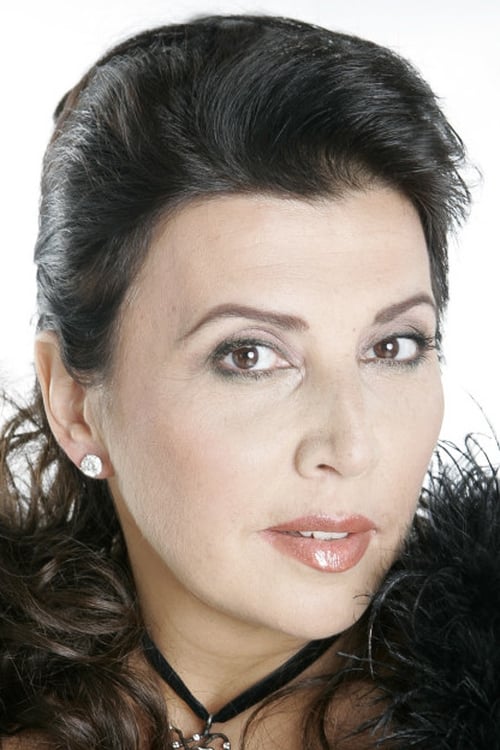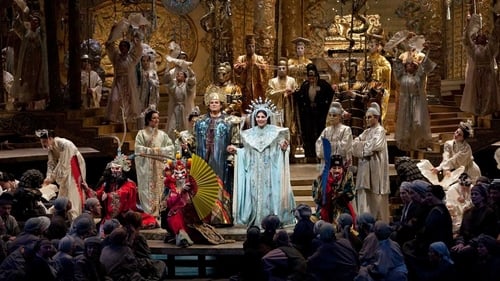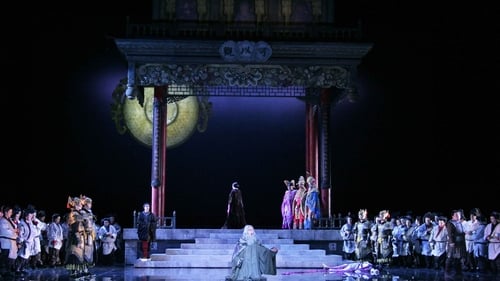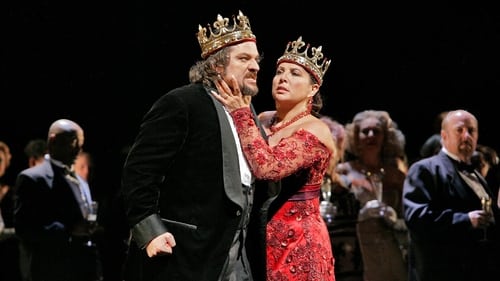
Maria Guleghina
Рождение : 1959-08-09, Odessa
История
Mariya Guléguina nació el 9 de agosto de 1959 en la ciudad ucraniana de Odesa cuando el país formaba parte de la Unión Soviética. Hija de padre armenio y madre ucraniana se formó en el Conservatorio de Música con Yevgueni Ivanov, quien la guiaría aún después de haber acabado sus estudios. Comenzó la carrera profesional en 1985 en la ópera del Estado en Minsk con el papel protagónico de Iolanta. Poco después partía de la URSS para seguir su carrera en el extranjero. En 1987 participó en Un ballo in maschera, en La Scala de Milán interpretando a Amelia junto a Luciano Pavarotti, que cantaba el papel de Ricardo. Interpretó I due Foscari, Manon Lescaut, y Tosca en los principales escenarios operísticos de Europa, en ciudades como Viena, Múnich, Hamburgo y Londres. En 1995 debutó en la ópera de París conNabucco en donde interpretó el papel de Abigail. Su debut en América se realizó en 1990 actuando en la Metropolitan Opera de Nueva York con la obra Andrea Chénier en donde interpretaba a Maddalena compartiendo tablas nuevamente con Pavarotti. Actuó también en las Ópera de San Francisco y la Ópera Lírica de Chicago. Ha realizado trabajos tales como Ernani, Simon Boccanegra, Cavalleria rusticana, Fedora añadiendo otros papeles más exigentes tales como Odabella en Attila y Lady Macbeth en Macbeth, ampliando así su repertorio. En 1992 actuó en el Teatro Mariinsky de San Petersburgo (Rusia), en el rol de Lisa de la ópera La dama de picas de Tchaikovsky. También se ha presentado con frecuencia en Japón. Y cantó la tradicionalaria de Aida en la inauguración del nuevo Teatro Nacional de Ópera de Oslo (Noruega).

Abigaille
Wiener Staatsoper Live at Home - 14 May 2015

Princess Turandot
The Arena di Verona Festival honors Italian stage director Franco Zeffirelli, and his legendary production of Turandot. Interpreted within the sumptuous surroundings of Verona Arena, this Puccini's masterpiece tells the story of a princess whose beauty was only comparable to her cruelty. She will only marry a prince capable of solving her riddles, but if he fails, he will be beheaded... For this edition, the lyrical festival invites the russian soprano Maria Guleghina who proved a brilliant Turandot. She took to the stage with Salvatore Licitra's trump card is his imposingly radiant tenor voice of wich he remains in sovereign control, and the soprano Tamar Iveri is a beautiful and sensitive Liù.

Turandot
Franco Zeffirelli's magnificient staging of Puccini's final opera - a fairy tale set in a mythical China - is one of the most popular in the Met repertory. In this Live in HD production, Maria Guleghina takes on the title role and Marcello Giordani is Calaf, the unknown prince. Marina Poplavskaya and Samuel Ramey co-star, and Andris Nelsons conducts in his Met debut.

Turandot
Internationally acclaimed Chinese film-maker Chen Kaige delivers an opulent staging of the fairy-tale story of Chinese Princess Turandot, who will only marry a prince capable of solving her riddles. With sumptuous costumes and palace sets designed in China, Kaige's production adds a compellingly authentic accent to Puccini's exotic orchestral palette. Zubin Metha and his brilliant Orquestra de la Comunitet Valenciana offer "genuine foreworks of sound" (Wiener Zeitung), Maria Guleghina triumphs as Turandot. Recorded in 2008 at the Palau de les Arts in Valencia. Zubin Mehta (conductor).

Lady Macbeth
Verdi’s admiration for Shakespeare led to such masterpieces as Othello and Falstaff, and if the earlier Macbeth isn’t on their exalted level it’s still a powerfully dramatic opera that hews closely to the original’s story line. The MET’s production retains the dark aura of the opera while updating it to a vaguely post-modern context. So the witches are bag ladies in various stages of decrepitude, with children in tow. The Banquet Scene features lowered chandeliers, a plethora of chairs, and a slew of extras dressed in tuxedos and party gowns. Macbeth sports a leather coat, the soldiers are in drab brown uniforms and seem to have fingers on their triggers even when they’re supposed to be in non-threatening situations. Director Adrian Noble also has Lady Macbeth do an inordinate amount of writhing around and singing from a lying-down position, adding to the feeling that a less interventionist directorial hand might have generated more impact.

Three one-act operas by Puccini: the first a suspenseful tale of cheating lovers; the second a sentimental tearjerker about a mother yearning to hear from her lost child. The third is a dark comedy of greedy relatives and their inheritance.

The spectacular production from the 2007 festival at the historic Arena di Verona. Renowned Verdi singers Leo Nucci and Maria Guleghina take on the roles of Nabucco and his daughter Abigail. Daniel Oren conducts Verona's resident orchestra. Filmed in High-Definition.

Abigaille
Nabucco - live performance by Helikon Opera Theatre of Moscow at the Opéra de Massy, Paris.

Lady Macbeth
Carlos Álvarez takes the title role in the first of Verdi's Shakespearean operas, with Maria Guleghina as the manipulative wife whose desire to gain the Scottish throne drives her husband to murder and leaves both with blood on their hands. Bruno Campanella conducts the Symphony Orchestra and Chorus of the Gran Teatre del Liceu in the 2004 recording of Phyllida Lloyd's powerful production, first staged at London's Royal Opera House.

Lisa
The Queen of Spades, Op. 68 (Russian: Пиковая дама, Pikovaya dama, French: Pique Dame) is an opera in 3 acts (7 scenes) by Pyotr Ilyich Tchaikovsky to a Russian libretto by the composer's brother Modest Tchaikovsky, based on a short story of the same name by Alexander Pushkin, but the plot was very changed. The premiere took place in 1890 in St. Petersburg (at the Mariinsky Theatre), Russia.

Amelia
Conducted by Riccardo Muti, the master of the Scala in Milan for twenty years, the Verdian melodrama unfolds before our eyes. This Cavani's approach is ageless and excellence is pre-eminent: to start with, the role of Riccardo is played by the wonderful Salvatore Licitra. As for Maria Guleghina, she plays an exceptionally good Amelia. Riccardo Muti proves once again what a wonderful Verdian he is.

Abigaille
Nabucco - live from Metropolitan Opera, June 2002. On its surface, Nabucco is about the epic struggle of Zaccaria and the Jews suppressed by Babylon’s King Nebuchadnezzar and his vengeful daughter, Abigaille. But to Italians fighting for their freedom from Austria, Verdi’s first great opera was an inspiring call to arms.

Floria Tosca
Tosca is an opera in three acts by Giacomo Puccini to an Italian libretto by Luigi Illica and Giuseppe Giacosa. It premiered at the Teatro Costanzi in Rome on 14 January 1900. This version is conducted by Riccardo Muti at La Scala, Milan.

Manon
TDK presents a recording of Puccini’s heart-breaking opera from one of the best opera houses of the world featuring star tenor José Cura and remarkable soprano Maria Guleghina as the two inseparable lovers. Riccardo Muti, music director of La Scala at the time of this performance, gives full weight to the alternation of social realism and private amatory psychology, of crowds and intimacy, body and spirit. And the director of this Milan production, the famous Italian film director Liliana Cavani, provides it with a realistic setting. Every scene looks like a genre painting, from which Puccini’s psychograms emerge musically. This forms the background for the two outstanding singer actors, who take the lead roles.

Lady Macbeth
Live from La Scala December 7th 1997

Maddalena di Coigny
This live from the Met telecast from October 1996 of Giordano’s infrequently performed verismo gem is an absolute pleasure to watch and listen to and I highly recommend it. Nicholas Joel’s production is extremely elegant while at the same time being simple and uncluttered. Act I, for example, is dominated by an enormous gilt-framed mirror precariously tilted. I assume that it is a metaphor for the imminent downfall of the decadent aristocracy at the party given by the Contessa di Coigny. The costumes designs by Hubert Monloup are terrific. The prerevolutionary costumes in Act I are simply stunning each one individually tailored for the choristers and major performers.

Giorgetta




